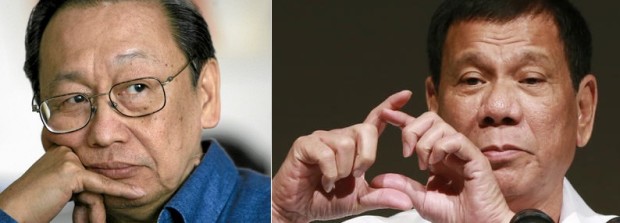Duterte, advisers discussing future of peace talks – Malacañang

President Rodrigo Duterte (right) is talking to his advisers after he scrapped the government’s peace talks with the National Democratic Front. At left is Communist Party of the Philippines founder Jose Ma. Sison. INQUIRER FILES
President Duterte has been consulting with his peace advisers after scrapping talks with communist rebels, as one-time professor and Communist Party of the Philippines founder Jose Maria Sison urged him to return to the negotiating table, his spokesperson said on Saturday.
An angry Mr. Duterte ended the peace talks after the New People’s Army announced it would lift a ceasefire it had unilaterally declared on Feb. 10. The rebels killed three soldiers before the termination took effect.
Sison on Friday urged Mr. Duterte to consider the gains of three rounds of discussions and urged him to allow backchannel meetings between the government peace panel and the National Democratic Front of the Philippines (NDFP) to pave the way for the resumption of discussions.
The NDFP is the political arm of the communist movement, which began its insurgency in 1969 that has since left tens of thousands of combatants and civilians dead.
“I’m sure the President is a listening President and he will continue to consider the advice of his secretaries and peace advisers. Let’s see what will be the developments in the coming days,” Presidential Spokesperson Ernesto Abella said.
Article continues after this advertisementAbella said the communist rebels must do something to convince the government of their sincerity in talking peace.
Article continues after this advertisement“Confidence-building measures are needed from the New People’s Army so that it could be seen that they are sincere, if they are really interested in continuing the peace talks,” Abella said.
He also took note of the apparent disconnect between guerrilla leaders on the ground and their comrades engaged in talks.
Grassroots
Aside from halting the negotiations, Mr. Duterte also terminated the Joint Agreement on Safety and Immunity Guarantees with the NDFP, which allows the arrest of its peace talks consultants.
Peace advocates have called on communities and grassroots organizations to speak out against the collapse of peace negotiations, urging both sides not to squander the gains they built since negotiations were resumed last year.
“In the long run, the main stakeholders are the people. We must not only watch and listen but speak out for the continuation of the peace talks,” said Sharon Rose Ruiz-Duremdes, cochair of the Philippine Ecumenical Peace Platform in Western Visayas, a Church-based network of peace advocates.
‘Significant gains’
Duremdes said that there have been “significant gains” since talks began in August last year, with expectations that the next steps would tackle significant issues relating to socioeconomic reforms.
She urged the President to reconsider his pronouncement and for both parties to pursue the next rounds of talks set for Feb. 22 in The Netherlands and in Norway in April.
Mayor Roberto Palomar of Tapaz town in Capiz said he was also hoping that the peace negotiations would continue.
“It is the prerogative of the President to continue or stop the negotiations (with the rebels). But I am not losing hope that we can still attain peace,” Tapaz told the Inquirer.
Tapaz is among the towns affected most by the insurgency in Western Visayas. —WITH REPORTS FROM NESTOR P. BURGOS JR./rga